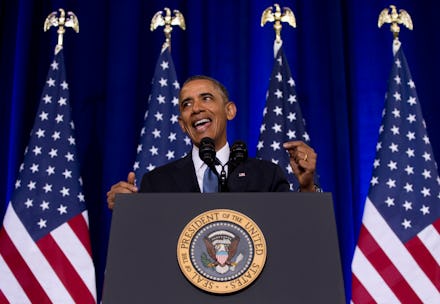5 Big Things You Need to Know From Obama's NSA Spy Speech

On Friday, President Barack Obama announced his plans to reform the National Security Agency and its surveillance operations.
In a speech that started with the history of intelligence operations in the United States going all the way back to the American Revolution, Obama defended the need for government surveillance but acknowledged that there are "tough questions about what we should do."
He stressed the need for "adequate public debate" on privacy issues, and ensured Americans that NSA operatives "consistently followed protocols." Still, he noted the "possibility for abuse."
Obama lamented the "crude characterizations" and "speculation and hypotheticals" surrounding the debate over NSA activity so far, and seemingly condemned the leaks: "the whole point of intelligence is to obtain information not publicly available ... intelligence agencies cannot function without secrecy," he said.
But this speech was about reform. And though the U.S. "can't unilaterally disarm [its] intelligence capabilities," here are the five major takeaways from Obama's speech (which you can read in full here):
1. Obama will end bulk metadata collection "as it currently exists"
The president signaled the start of a "transition" away from the government's bulk collection of phone record metadata as it looks today.
This means a creation of a new survelliance program "without the government holding this bulk metadata." So the NSA will still have access to phone record metadata, but it won't hold it indefinitely. What this new program will look like is yet to be determined, but one option Obama mentioned was the possibility of a third party retaining the metadata.
2. The NSA will have to ask the FISA court when it wants to search phone record metadata
The NSA will need a court order from the Foreign Intelligence Surveillance court when it wants to "query" the phone record metadata that has been collected. Up until now it only needed reasonable suspicion. And the NSA will have more limited access to specific phone data, only being able to search phone numbers two connections away from the original queried number, instead of three.
3. A panel of private advocates will argue before the FISA courts
Obama said he will establish a "panel of private advocates from outside government to provide an independent voice" in front of the FISA court. This is to ensure the arguments made before the FISA court are balanced, and independent privacy concerns are heard before any authorization is granted to the NSA.
4. The NSA will continue to monitor foreign intelligence
Obama defended the NSA's foreign surveillance as imperative to keeping the U.S. safe from outside attacks. But there will be some reform. Obama said that he will "clearly prescribe what we do and do not do when it comes to our overseas surveillance." He threw some shade at the other countries criticizing U.S. spying: "We will not apologize simply because our services may be more effective."
5. Obama released a new policy directive for intelligence operations
Along with his speech, the president released a policy directive dictating new regulations for the NSA and U.S. surveillance operations. According to the president it will "strengthen oversight" while maintaining relationships with private companies and foreign powers, with a "committment to privacy and basic liberties." The new directive clearly outlines what the NSA can and cannot do, and which circumstances apply to admissable searches and data collection.